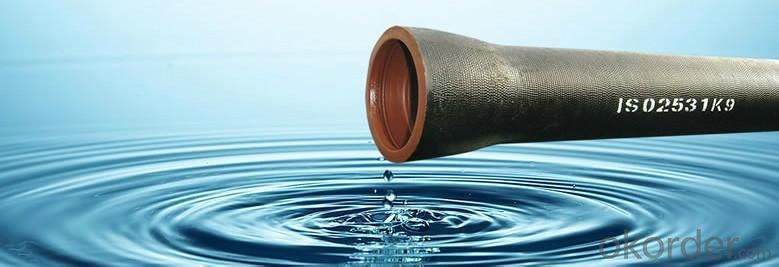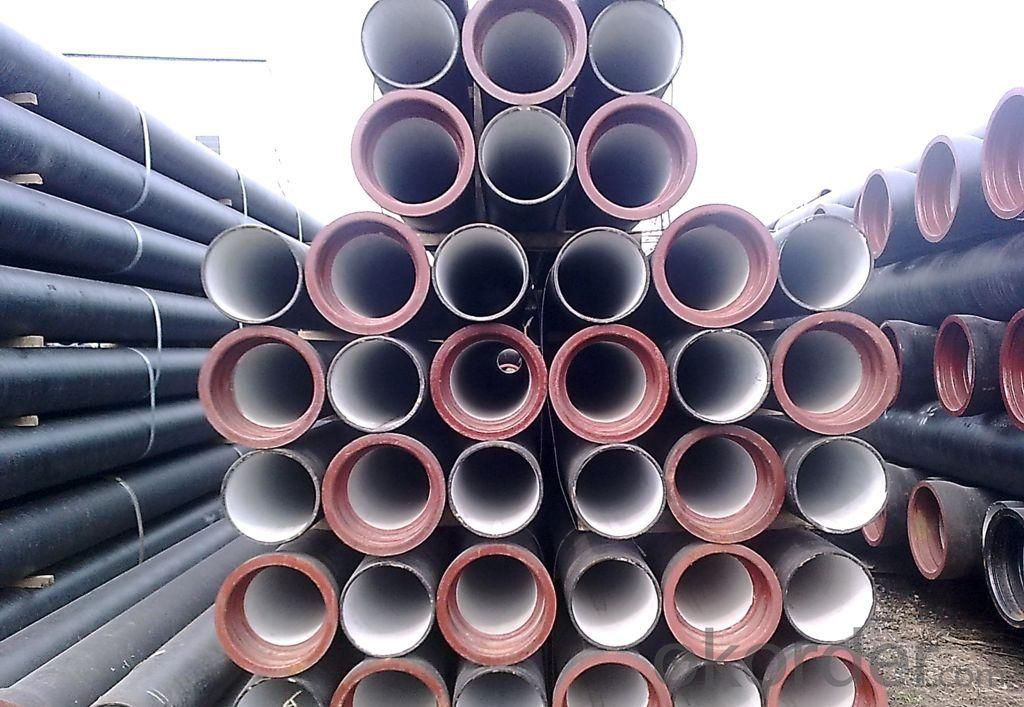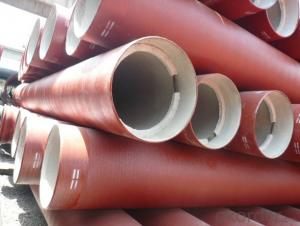Ductile Iron Pipe DN400 EN545/EN598/ISO2531 C30
- Loading Port:
- China main port
- Payment Terms:
- TT or LC
- Min Order Qty:
- 20 m.t.
- Supply Capability:
- 200000 m.t./month
OKorder Service Pledge
OKorder Financial Service
You Might Also Like
1,Ductile Iron Pipe Description :
DI pipe fittings are manufactured according to ISO 2531 or BS EN545 or BS4772 FOR POTABLE WATER ,internal is cement lining or wet epoxy coating;External is zinc plus bitumen or wet epoxy coating. We also manufacture ductile iron fittings with fusion bonded epoxy both inside and outside. All the producets are sutible to water pipes fields.We have passed ISO9001,ISO14001,OHSMS18001 certificate.Pipes confirm to ISO2531,K9 class,T type joint,6m long,with inside cements lining conform to ISO4179, outside Zinc
spraying(130g/m2) and bitumen coating(70μm) conform to ISO8179.Pipe ends: Spigot and socket ends, with 100% SBR rubber gaskets accoding to ISO4633
2,Main Features of the Ductile Iron Pipe:
1).Quality guarantee
• Chemical checking
• NDE after rough machining
• Mechanical testing after heat treatment
• Final NDE,dimension inspected
2).Quality document
• Full Q.A document as per client request
3).Packing and Shipping
• standard export package(carton/wooden case/pallet)
• accept FOB,FAS,CNF,CIF door to door etc or customer designated shipping agent
4).Service
• Drawing: we can translate your original drawing, offer best suggestion on design
• Quality: we have full set quality control system to guarantee the best quality.
• Inspection: inspect in house, all our products must be checked 3 times before packing
3,Ductile Iron Pipe Images:


4. Ductile Iron Pipe Specification:
Surface Finishes: Bare, Oiled, Mill Varnish, Galv,FBE, FBE Dual, 3LPE, 3LPP, Coal Tar,Concrete Coating and Tape Wrap
End Finishes: Beveled, Square Cut, Threaded, hat
Additional Services: Internal Coating
Packaging: packed in bag, plastic bag, steel strip, steel wire,double wire, iron box, wooden box, tarpaulin, plastic sheeting
Inspection: MOODY SGS BV GL DNV ABS LIOYD’S
Test: X-ray, UT, magnetic particle,inspection,hydrostatic test.
Documentary: MTC, material certification,Origin certification, CI or PI,Test Report, export licence, handling order, B/L,insurance policy,shipping instructions, contract, packing list etc.
5.FAQ:
We have organized several common questions for our clients,may help you sincerely:
1.Q: Why would you choose ductile iron pipe rather than other pipe materials?
A:The reasons are obvious for that not only ductile iron pipe possesses the inherent strength and flexibility of ductile iron, combined with proven corrosion protection systems, but also the cost savings can be achieved from design to installation and commissioning.
2.Q:Why can you guarantee the inner of pipes can’t be corroded?
A: High alumina cement mortar lining and sulphate-resistant cement mortar lining. These two special linings are applicable to inner anti-corrosion for sewage pipes, improving resistance to erosion of the sewage components.
- Q:What is the average cost of ductile iron pipe?
- The average cost of ductile iron pipe can vary depending on several factors such as the diameter, length, and thickness of the pipe, as well as the supplier and location. On average, however, ductile iron pipe can range from approximately $40 to $200 per linear foot. It is important to note that these prices are estimates and can fluctuate based on market conditions and other variables. It is recommended to contact local suppliers or distributors for specific pricing information tailored to your project requirements.
- Q:What is the expected thermal expansion of ductile iron pipes?
- Several factors, including the iron's composition, temperature range, and pipe length, can affect the expected thermal expansion of ductile iron pipes. Generally, these pipes have a coefficient of thermal expansion between 10 and 13 µin/in/°F. This implies that for every one degree Fahrenheit rise in temperature, the ductile iron pipe will expand by around 10 to 13 microinches per inch in length. It is worth mentioning that this estimation is approximate and may slightly differ based on the pipe's specific conditions and characteristics.
- Q:What is the acceptance of cast iron pipe material?
- A cast pipe made of cast iron. Cast iron pipes are used for water supply, drainage and gas transmission lines. They include cast iron pipes and pipe fittings. Labor intensity is small.
- Q:Can ductile iron pipes be used for slurry transportation?
- Yes, ductile iron pipes can be used for slurry transportation. Ductile iron pipes are known for their high strength and durability, making them suitable for various applications including slurry transportation. Slurry is a mixture of solid particles and a liquid, which can be abrasive and corrosive. Ductile iron pipes have excellent resistance to abrasion, corrosion, and erosion, making them capable of handling the challenges posed by slurry transportation. Additionally, ductile iron pipes offer a smooth inner surface, reducing friction and improving the flow of slurry. Therefore, ductile iron pipes are a reliable choice for slurry transportation systems in industries such as mining, wastewater treatment, and oil and gas.
- Q:What is the content of silicon in silicon molybdenum ductile iron?
- High silicon molybdenum ductile cast iron is developed for end users successfully reduces the cost, and the castings have high strength, good oxidation resistance, and has good performance under thermal cycling condition. This kind of ductile iron silicon content of 4% molybdenum content 0.6%-0.8%, currently designated as many car manifold and turbocharger shell, and molybdenum content than the silicon alloy casting 1% more for special high temperature exhaust pipe, heat treatment. High silicon molybdenum alloy nodular cast iron castings used in the production of automotive turbocharger.
- Q:What is the expected deflection capability of ductile iron pipes?
- The expected deflection capability of ductile iron pipes is typically quite high compared to other pipe materials. Ductile iron pipes have a flexible nature that allows them to withstand external loads and stresses without breaking or cracking. This flexibility enables the pipes to deflect under pressure, absorbing the force and redistributing it evenly along the pipe's length. The specific deflection capability of ductile iron pipes can vary depending on factors such as pipe diameter, wall thickness, and soil conditions. However, in general, ductile iron pipes can typically deflect up to 2% to 5% of their diameter without causing any significant damage or compromising their structural integrity. This deflection capability allows the pipes to adapt to ground movement, thermal expansion, and other external forces, making them highly resilient and reliable for various applications. It is important to note that the deflection capability of ductile iron pipes should be considered in conjunction with other design criteria, such as the depth of the pipe burial, trench width, and backfill material. Following proper installation practices and adhering to industry standards and specifications will ensure that the expected deflection capability of ductile iron pipes is optimized and maintained throughout their service life.
- Q:What if the ductile iron pipe is broken?
- Ductile iron pipe rupture can be repaired by using a cast iron defect repair machine, that is, a cast iron defect repair device. However, the general use of iron defects repair equipment can be repaired welding, and will not affect its use. Ductile iron pipes are used for water supply, so if it breaks, it will not be easy to handle. Make sure that the main valve is closed and repaired.
- Q:Can ductile iron pipes be used for submarine pipelines?
- Submarine pipelines can indeed utilize ductile iron pipes. Ductile iron, celebrated for its robustness and durability, proves suitable for a range of applications, including those submerged underwater. For decades, ductile iron pipes have been successfully employed in the construction of submarine pipelines. They possess the ability to endure the harsh conditions prevalent in underwater environments, such as corrosion, pressure, and shifting seabeds. Furthermore, ductile iron pipes display exceptional resistance to external loads, rendering them ideal for submarine pipelines that bear the weight of water and potential impacts. However, it remains imperative to consider factors such as coating, cathodic protection, and proper installation techniques to ensure the long-term performance and integrity of the submarine pipeline.
- Q:Can ductile iron pipes be used for cooling water systems?
- Indeed, cooling water systems can utilize ductile iron pipes. Renowned for their resilience, robustness, and resistance to corrosion, ductile iron pipes are a fitting choice for various applications, including cooling water systems. With the ability to withstand high pressure and temperature fluctuations, these pipes excel in circulating and transporting cooling water. Moreover, their smooth interior surface mitigates friction, diminishing the likelihood of scaling or blockages and enabling the efficient flow of cooling water. Consequently, ductile iron pipes emerge as a dependable and efficient option for cooling water systems.
- Q:Can ductile iron pipes be used for underground water treatment systems?
- Yes, ductile iron pipes can be used for underground water treatment systems. Ductile iron is known for its strength and durability, making it a suitable choice for underground applications. Additionally, ductile iron pipes have excellent corrosion resistance, which is important for water treatment systems that may come into contact with various chemicals and contaminants.
1. Manufacturer Overview |
|
|---|---|
| Location | |
| Year Established | |
| Annual Output Value | |
| Main Markets | |
| Company Certifications | |
2. Manufacturer Certificates |
|
|---|---|
| a) Certification Name | |
| Range | |
| Reference | |
| Validity Period | |
3. Manufacturer Capability |
|
|---|---|
| a)Trade Capacity | |
| Nearest Port | |
| Export Percentage | |
| No.of Employees in Trade Department | |
| Language Spoken: | |
| b)Factory Information | |
| Factory Size: | |
| No. of Production Lines | |
| Contract Manufacturing | |
| Product Price Range | |
Send your message to us
Ductile Iron Pipe DN400 EN545/EN598/ISO2531 C30
- Loading Port:
- China main port
- Payment Terms:
- TT or LC
- Min Order Qty:
- 20 m.t.
- Supply Capability:
- 200000 m.t./month
OKorder Service Pledge
OKorder Financial Service
Similar products
New products
Hot products
Related keywords



























